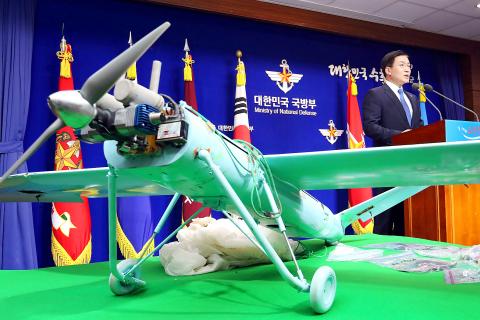Suspected North Korean drone surveillance is a “grave provocation” which violates the Korean Armistice Agreement, Seoul said yesterday, demanding a UN probe into a drone that crashed near the border between the two Koreas.
A drone, which had been photographing a controversial US missile defense shield, was discovered earlier this month after it crashed close to a sensitive military installation along the heavily fortified border, the South Korean military said.
“The latest action by the North ... is a grave provocation and a wanton violation of the armistice,” South Korean Joint Chiefs of Staff first deputy director Jeon Dong-jin said, referring to the treaty which ended the 1950 to 1953 war.

Photo: EPA
A full investigation into the drone’s wreckage discovered its planned itinerary and confirmed that it had taken off from the North before capturing more than 500 photographs of the South’s territory, the South Korean Ministry of National Defense said.
“We strongly condemn the North’s series of drone provocations and urge it to stop all such provocations immediately,” Jeon said, vowing “strong retaliation” against any further actions by Pyongyang.
South Korea has requested an investigation by the UN Command, which is in charge of supervising the armistice that ended open conflict between the two sides, but has never been replaced with a final peace treaty.
The South Korean military said it was bolstering defenses against potential spying activities by North Korean drones, adding more border surveillance radars and anti-aircraft guns to shoot down drones.
Photographs retrieved from the latest drone include several overviews of the site for the Terminal High Altitude Area Defense system in the southeastern county of Seongju, the South Korean military said.
The powerful US antimissile system was installed this year to guard against growing missile threats from the nuclear-armed North.

CALL FOR SUPPORT: President William Lai called on lawmakers across party lines to ensure the livelihood of Taiwanese and that national security is protected President William Lai (賴清德) yesterday called for bipartisan support for Taiwan’s investment in self-defense capabilities at the christening and launch of two coast guard vessels at CSBC Corp, Taiwan’s (台灣國際造船) shipyard in Kaohsiung. The Taipei (台北) is the fourth and final ship of the Chiayi-class offshore patrol vessels, and the Siraya (西拉雅) is the Coast Guard Administration’s (CGA) first-ever ocean patrol vessel, the government said. The Taipei is the fourth and final ship of the Chiayi-class offshore patrol vessels with a displacement of about 4,000 tonnes, Lai said. This ship class was ordered as a result of former president Tsai Ing-wen’s (蔡英文) 2018

UKRAINE, NVIDIA: The US leader said the subject of Russia’s war had come up ‘very strongly,’ while Jenson Huang was hoping that the conversation was good Chinese President Xi Jinping (習近平) and US President Donald Trump had differing takes following their meeting in Busan, South Korea, yesterday. Xi said that the two sides should complete follow-up work as soon as possible to deliver tangible results that would provide “peace of mind” to China, the US and the rest of the world, while Trump hailed the “great success” of the talks. The two discussed trade, including a deal to reduce tariffs slapped on China for its role in the fentanyl trade, as well as cooperation in ending the war in Ukraine, among other issues, but they did not mention

Japanese Prime Minister Sanae Takaichi yesterday lavished US President Donald Trump with praise and vows of a “golden age” of ties on his visit to Tokyo, before inking a deal with Washington aimed at securing critical minerals. Takaichi — Japan’s first female prime minister — pulled out all the stops for Trump in her opening test on the international stage and even announced that she would nominate him for a Nobel Peace Prize, the White House said. Trump has become increasingly focused on the Nobel since his return to power in January and claims to have ended several conflicts around the world,

GLOBAL PROJECT: Underseas cables ‘are the nervous system of democratic connectivity,’ which is under stress, Member of the European Parliament Rihards Kols said The government yesterday launched an initiative to promote global cooperation on improved security of undersea cables, following reported disruptions of such cables near Taiwan and around the world. The Management Initiative on International Undersea Cables aims to “bring together stakeholders, align standards, promote best practices and turn shared concerns into beneficial cooperation,” Minister of Foreign Affairs Lin Chia-lung (林佳龍) said at a seminar in Taipei. The project would be known as “RISK,” an acronym for risk mitigation, information sharing, systemic reform and knowledge building, he said at the seminar, titled “Taiwan-Europe Subsea Cable Security Cooperation Forum.” Taiwan sits at a vital junction on